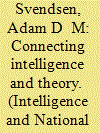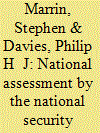|
|
|
Sort Order |
|
|
|
Items / Page
|
|
|
|
|
|
|
| Srl | Item |
| 1 |
ID:
091751


|
|
|
|
|
| Publication |
2009.
|
| Summary/Abstract |
Colin Davidson was the British consular official in Japan during and after World War I delegated to run intelligence operations in the country on behalf of the British Indian security authorities. Davidson's original target, Indian revolutionaries based in Japan, soon expanded to include their clandestine links to powerful Japanese political patrons, violating the spirit of the Anglo-Japanese Alliance (1902-23). Davidson's expertise on Japan, combined with intelligence on Japanese ultranationalist support of Indian independence, proved crucial for confirming suspicions about secret Japanese intent against the British Empire, contributing to the decision not to renew the Alliance.
|
|
|
|
|
|
|
|
|
|
|
|
|
|
|
|
| 2 |
ID:
091756


|
|
|
|
|
| Publication |
2009.
|
| Summary/Abstract |
Intelligence liaison increased exponentially during the so-called 'War on Terror'. Today it continues as the most significant dimension of intelligence, including impacting on accountability and oversight considerations. Nevertheless, the intelligence liaison phenomenon remains largely under-studied and substantially under-theorized. In this article, preliminary suggestions are offered concerning how this dearth of theory can be addressed. Firstly, the relevance of international relations theory and other bodies of theory, together with significant approaches concerning how international relations - extending to how intelligence and intelligence-related phenomena (such as, in this article, intelligence co-operation) - can be studied, are explored. These theories, and equally, approaches, are arguably most appropriate when deployed in an arrangement of 'complex co-existence plurality' across the different interrelated levels of experience and analysis, and they offer more effective explanations when intelligence liaison is disaggregated into at least eight systemic attributes or variables. More broadly, the suggestion that international relations theory, and indeed theory generally, is 'irrelevant' to intelligence studies is simultaneously challenged.
|
|
|
|
|
|
|
|
|
|
|
|
|
|
|
|
| 3 |
ID:
091746


|
|
|
|
|
| Publication |
2009.
|
| Summary/Abstract |
When internment was introduced in Northern Ireland on 9 August 1971, the Stormont and British Governments received immediate criticism for the move from within the United Kingdom and the Republic of Ireland. Condemnation widened as reports of ill-treatment at the hands of the security forces during arrest, whilst in custody and employed in conjunction with interrogation reached the public domain. After arrest prisoners were first questioned by the police to confirm the right person had been arrested and to establish whether they should be questioned with a view to preferring a criminal charge, whether they should be transferred to an interrogation centre for secondary interrogation with the aim of eliciting intelligence, or, if unsuitable for either of these, be released. In addition to secondary interrogation, 14 men were interrogated 'in-depth'.
|
|
|
|
|
|
|
|
|
|
|
|
|
|
|
|
| 4 |
ID:
091748


|
|
|
|
|
| Publication |
2009.
|
| Summary/Abstract |
At a time of intense debate over the specific organizational arrangements of American national security agencies with new or refocused intelligence responsibilities, the relative proximity between intelligence producers and consumers is a key issue. Intelligence capabilities may have to be kept separate from decision-making because of organizational economies of scale and scope, but separation alone does not mean intelligence must be distant from decision-making. For example, the British style of analysis involves a much closer relationship between intelligence producers and consumers than exists in the American context. Efforts to improve the integration of intelligence into decision-making by closing the distance between them would do well to study the history and efficacy of this process as they look to create new ways of structuring the relationship between intelligence analysis and decision-making. Specifically, history demonstrates that the US National Security Council staff implemented a process in 1968 through 1980 that approximated the British style of analysis, and this may provide US policymakers with a model for bridging the gap between intelligence analysis and decision-making.
|
|
|
|
|
|
|
|
|
|
|
|
|
|
|
|
|
|
|
|
|